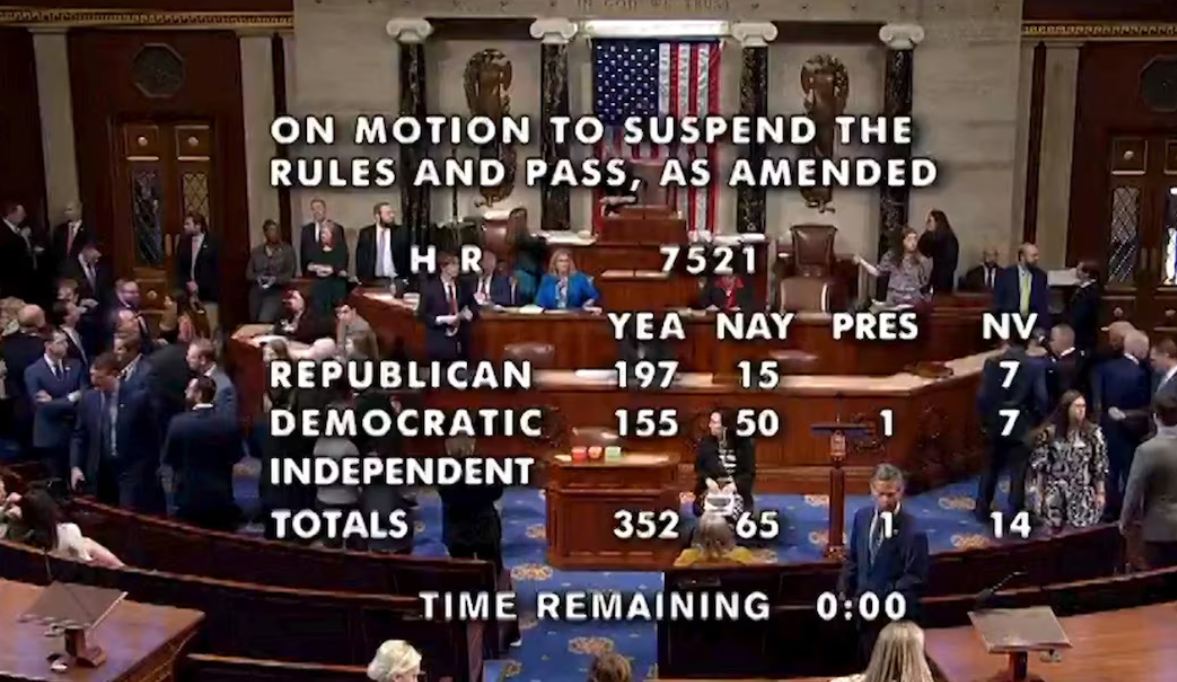US House passes bill to force ByteDance to divest TikTok or face ban


WASHINGTON — The US House of Representatives overwhelmingly passed a bill on Wednesday (March 13) that would give TikTok's Chinese owner ByteDance about six months to divest the US assets of the short-video app, or face a ban, in the greatest threat to the app since the Trump administration.
The bill passed 352-65 in a lopsided bipartisan vote, but it faces a more uncertain path in the Senate where some favour a different approach to regulating foreign-owned apps posing security concerns. Senate Majority Leader Chuck Schumer said the Senate will review the legislation.

"This is a critical national security issue. The Senate must take this up and pass it," No. 2 House Republican Steve Scalise said on social media platform X.
The fate of TikTok, used by about 170 million Americans, has become a major issue in Washington. Lawmakers said their offices had received large volumes of calls from teenage TikTok users who oppose the legislation.
White House press secretary Karine Jean-Pierre said Wednesday "we want to see the Senate take swift action."
TikTok CEO Shou Zi Chew said in a video posted Wednesday the legislation if signed into law "will lead to a ban on TikTok in the United States... and would take billions of dollars out of the pockets of creators and small businesses. It will put 300,000 American jobs at risk."

He added the company will "not stop fighting" and will exercise its legal rights to prevent a ban.
He visited Capitol Hill on Wednesday on a previously scheduled trip and plans to return Thursday, a source briefed on the matter said, amid popular support for the app.
The measure is the latest in a series of moves in Washington to respond to US national security concerns about China, from connected vehicles to advanced artificial intelligence chips to cranes at US ports.
The political climate is growing in favour of the bill. President Joe Biden said last week he would sign it and White Hous national security adviser Jake Sullivan on Tuesday asked "Do we want TikTok, as a platform, to be owned by an American company or owned by China? Do we want the data from TikTok — children's data, adults' data - to be going, to be staying here in America or going to China?"
The Chinese Foreign Ministry criticised the legislation Tuesday, arguing "though the US has never found any evidence of TikTok posing a threat to the US's national security, it has never stopped going after TikTok."
[[nid:674809]]
A number of prominent Democrats in the House voted against the bill including House Democratic Whip Kathleen Clark, Arizona Senate candidate Ruben Gallego, Alexandria Ocasio-Cortez as well as the top Democrats on the Judiciary, Ways and Means, Transportation and Intelligence committees.
"There are serious antitrust and privacy questions here, and any national security concerns should be laid out to the public prior to a vote," Ocasio-Cortez said.
Senate Commerce Committee chair Maria Cantwell, who will play an important role in the Senate's next move, said she wants legislation "that could hold up in court," and is considering a separate bill, but is not sure what her next step is.
The vote comes just over a week since the bill was proposed following one public hearing with little debate, and after action in Congress had stalled for more than a year. Last month, President Joe Biden's re-election campaign joined TikTok, raising hopes among TikTok officials that legislation was unlikely this year.
The House Energy and Commerce Committee last week voted 50-0 in favour of the bill, setting it up for a vote before the full House.
Several dozen TikTok users rallied outside the Capitol before the vote. The company paid for their travel to Washington and accommodations, a TikTok spokesperson said.
But the political climate is growing in favour of the bill. Biden said last week he would sign it and White House national security adviser Jake Sullivan on Tuesday said the goal was ending Chinese ownership, not banning TikTok.
"Do we want TikTok, as a platform, to be owned by an American company or owned by China? Do we want the data from TikTok - children's data, adults' data — to be going, to be staying here in America or going to China?" he said.
It is unclear whether China would approve any sale or if TikTok's US assets could be divested in six months.
If ByteDance failed to do so, app stores operated by Apple, Alphabet's Google and others could not legally offer TikTok or provide web hosting services to ByteDance-controlled applications.
In 2020, then-President Donald Trump sought to ban TikTok and Chinese-owned WeChat but was blocked by the courts. In recent days he had raised concerns about a ban but nearly all House Republicans shrugged those off.
Representative Mike Gallagher, one of the bill's authors, said they don't want a ban but divestiture and said Trump if re-elected in November "may have an opportunity to consummate the deal of the century" in a TikTok sale.
It remains unclear if Tencent's WeChat or other high-profile Chinese-owned apps could face a ban under the legislation.
Any forced TikTok divestment from the US would almost certainly face legal challenges, which the company would need to file within 165 days of the bill being signed by the president.
There are still potential legal issues with the American Civil Liberties Union and other advocacy groups arguing the bill is unconstitutional on free speech and other grounds.
In November, a US judge blocked a Montana state ban on TikTok use after the company sued.


ALSO READ: US spy chief 'cannot rule out' that China would use TikTok to influence US elections